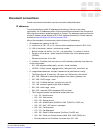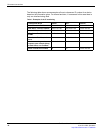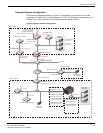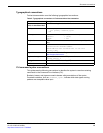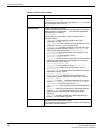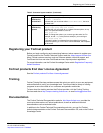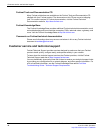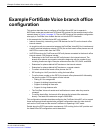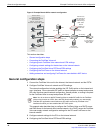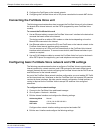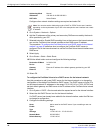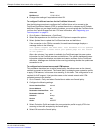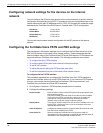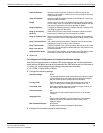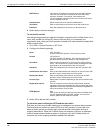
Example FortiGate Voice branch office configuration
FortiGate Voice Version 4.0 MR1 Administration Guide
01-410-112851-20100601 17
http://docs.fortinet.com/ • Feedback
Example FortiGate Voice branch office
configuration
This section describes how to configure a FortiGate Voice-80C unit to operate in
NAT/Route mode and provide basic UTM and SIP services for the example branch office
network shown in Figure 3 on page 18. The non-PSTN parts of this example configuration
also apply to FortiGate Voice models that do not include PSTN interfaces.
In this example the FortiGate Voice-80C unit provides:
• Internet connectivity, networking, and UTM features for the PCs on the branch office
internal network.
• An single line a/b wire connection between the FortiGate Voice-80C fxo1 interface and
a public switched telephone network (PSTN) line so that branch office phones can call
the PSTN or receive calls from the PSTN.
• VoIP PBX services for FortiFones and SIP soft phones connected to the branch office
internal network. PBX features include:
• Extensions to the FortiFones and SIP soft phones in the internal network. The
branch office phones use numeric extensions beginning with the number 6 and
including three more digits. Example valid extensions are 6123, 6456, and 6899.
• Extensions for phones behind NAT devices on the internal network.
• Extensions for phones behind NAT devices on a remote network.
• To collect voicemail the branch office phones dial *97.
• SIP trunking to a VoIP provider for calling the head office.
• To call a phone number on the PSTN, the branch office phones dial 9 followed by
the phone number. PSTN support will also include:
• Dialing 911 for emergencies
• Support for dialing international calls
• Support for dialing toll free calls
• Support for long distance calls
• The FortiGate Voice unit sends email notifications to users when they receive
voicemail.
• To call the head office, the branch office phones dial a head office extension
directly. The head office extension range is 2000-2999.
This configuration example describes configuring the FortiGate Voice-80C unit to support
these services and where required also provides configuration steps for other devices
such as the FortiFones and the remote FortiGate unit operating in NAT mode.
Details about the PSTN connection requirements, SIP trunking for the VoIP provider and
the Head Office SIP configuration are not described.



